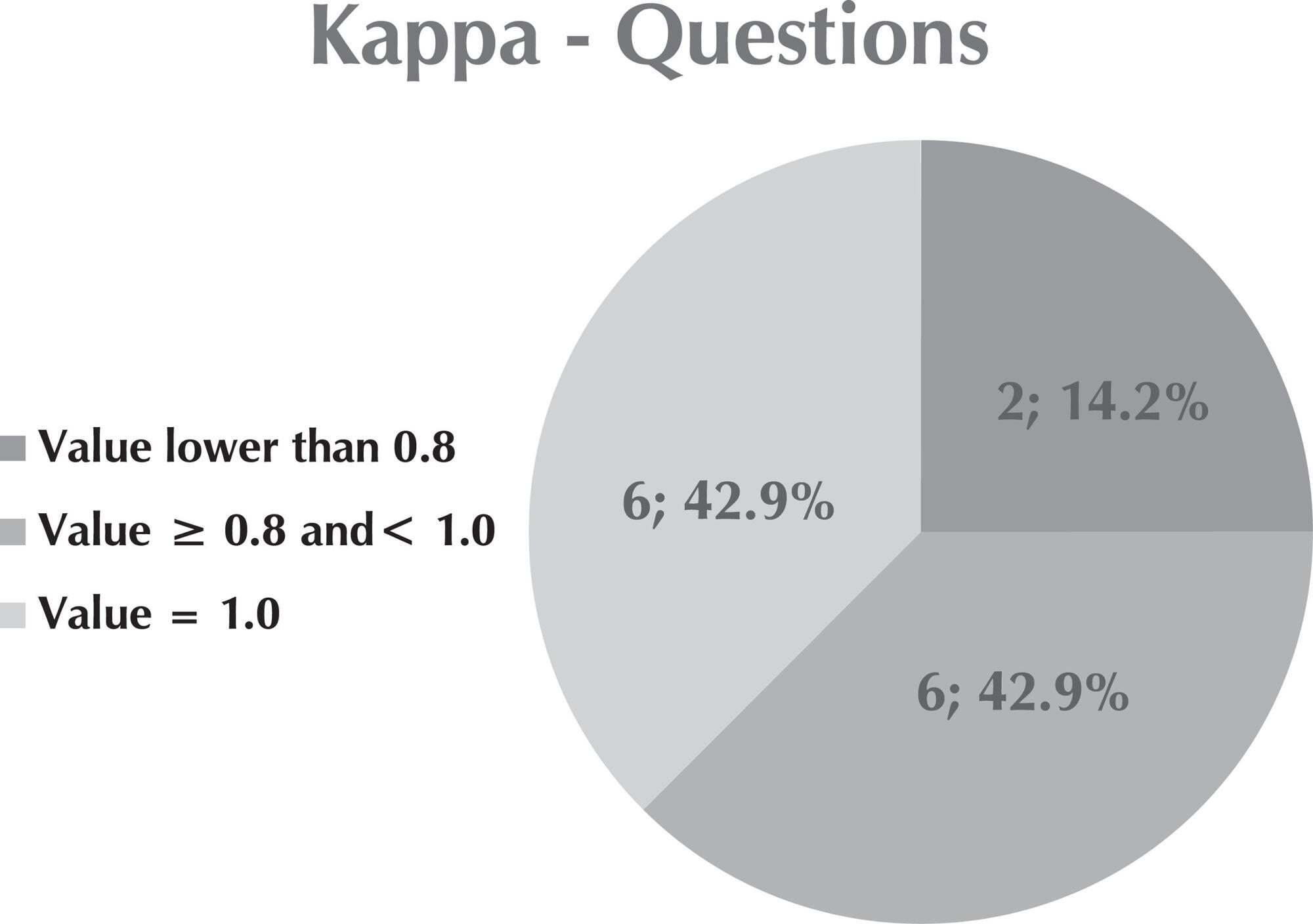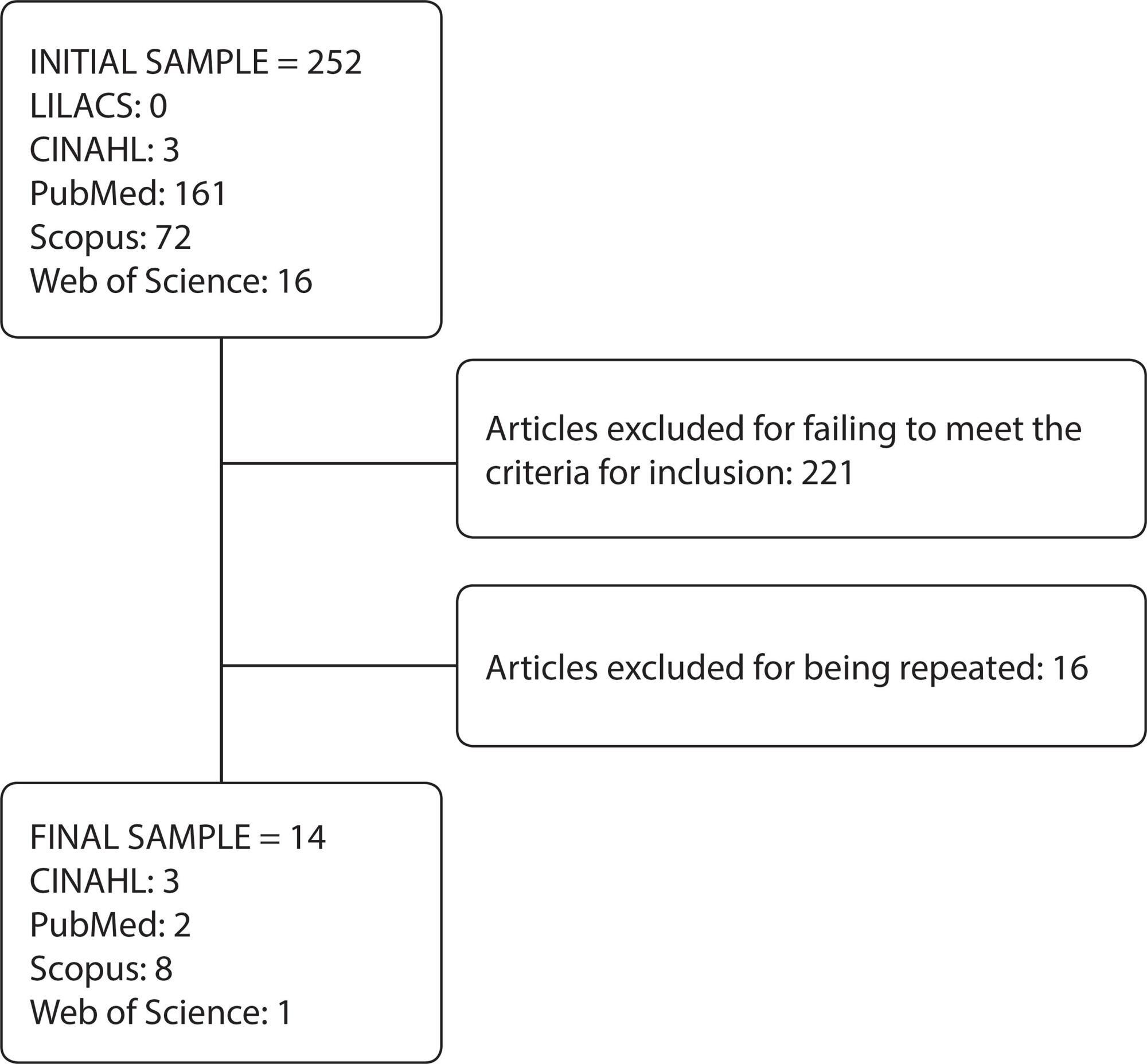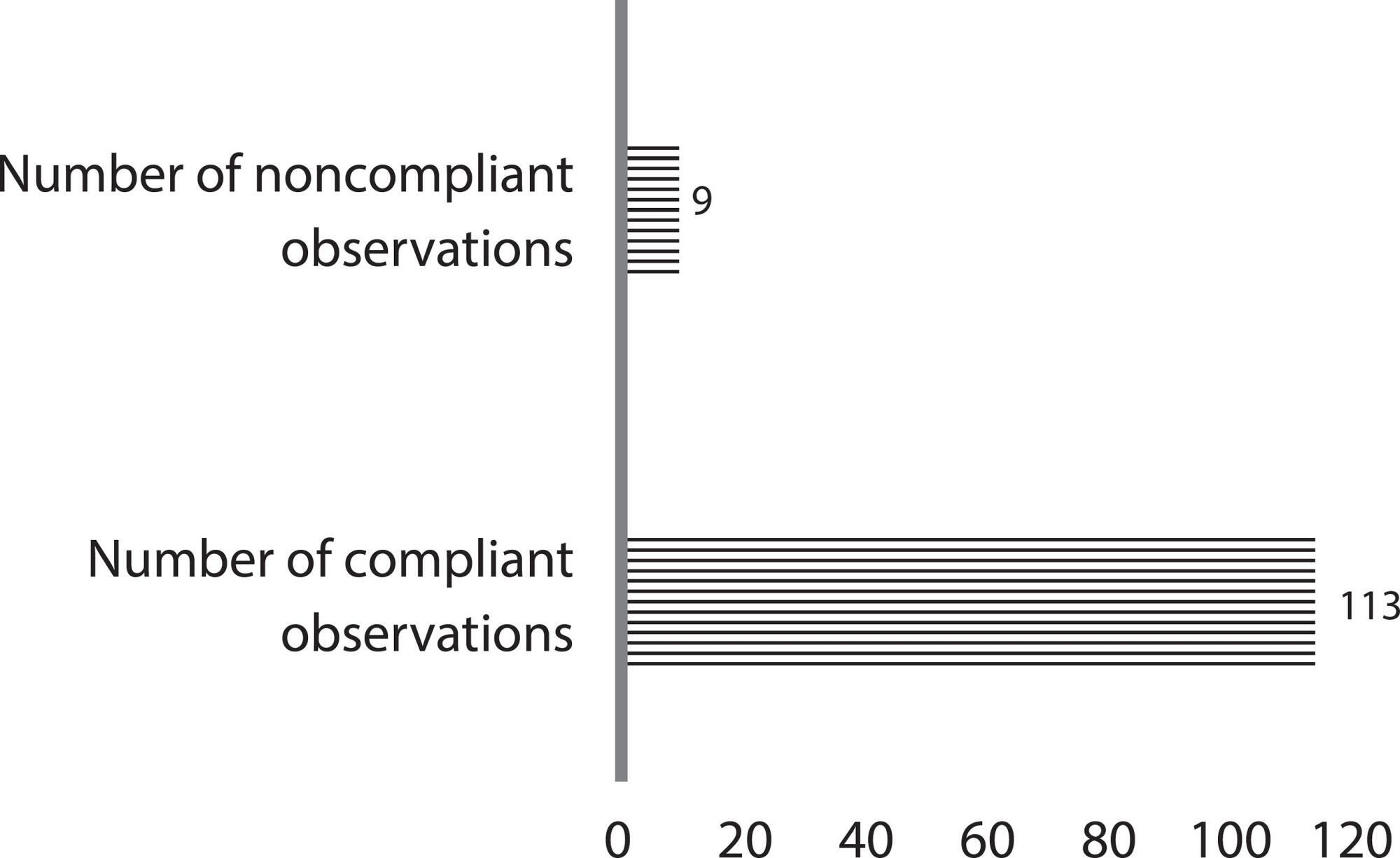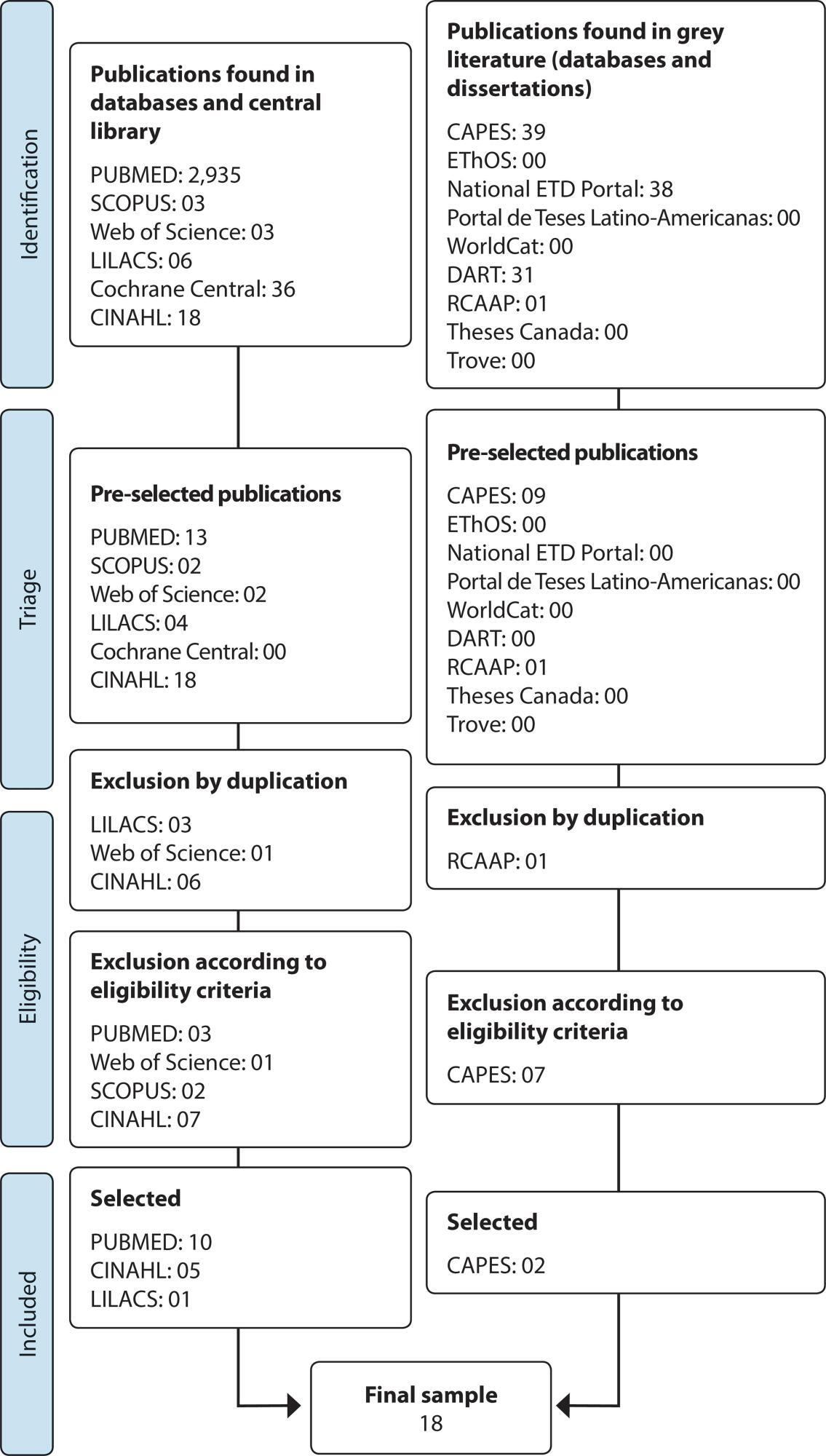-
RESEARCH01-01-2017
Virtual learning object and environment: a concept analysis
Revista Brasileira de Enfermagem. 2017;70(3):572-579
Abstract
RESEARCHVirtual learning object and environment: a concept analysis
Revista Brasileira de Enfermagem. 2017;70(3):572-579
DOI 10.1590/0034-7167-2016-0123
Views0See moreABSTRACT
Objective:
To analyze the concept of virtual learning object and environment according to Rodgers’ evolutionary perspective.
Method:
Descriptive study with a mixed approach, based on the stages proposed by Rodgers in his concept analysis method. Data collection occurred in August 2015 with the search of dissertations and theses in the Bank of Theses of the Coordination for the Improvement of Higher Education Personnel. Quantitative data were analyzed based on simple descriptive statistics and the concepts through lexicographic analysis with support of the IRAMUTEQ software.
Results:
The sample was made up of 161 studies. The concept of “virtual learning environment” was presented in 99 (61.5%) studies, whereas the concept of “virtual learning object” was presented in only 15 (9.3%) studies.
Conclusion:
A virtual learning environment includes several and different types of virtual learning objects in a common pedagogical context.

-
01-01-2017
High prevalence of enteroparasites in children from Ribeirão Preto, São Paulo, Brazil
Revista Brasileira de Enfermagem. 2017;70(3):566-571
Abstract
High prevalence of enteroparasites in children from Ribeirão Preto, São Paulo, Brazil
Revista Brasileira de Enfermagem. 2017;70(3):566-571
DOI 10.1590/0034-7167-2016-0059
Views0See moreABSTRACT
Objective:
To determine the prevalence of intestinal parasites and possible associated factors.
Method:
Cross-sectional epidemiological study of 962 children (3-12-years) from an area within the scope of a basic health unit in Ribeirão Preto, São Paulo, Brazil. Data were collected by home interviews and three-sample stool analysis and evaluated with the chi-square and Fisher’s exact tests (p<0.05).
Results:
The prevalence of intestinal parasites was significantly high (57.5%). Giardia lamblia was the most prevalent (50.8%), followed by Ascaris lumbricoides (17.8%), Entamoeba histolytica, Hymenolepis nana, Entamoeba coli and Enterobius vermiculares (5.6-7.3%) and other parasites of lower prevalence, such as Schistosoma japonicum (1%) and Schistosoma mansoni (0.5%). No statistically significant associations were detected between prevalence and the risk factors analyzed.
Conclusion:
Since the area presents good conditions of environmental sanitation, health education programs should be implemented that emphasize hygiene procedures for the hands and for food and water to be consumed by the population.

-
01-01-2017
Alta prevalencia de enteroparasitosis en niños de Ribeirão Preto, São Paulo, Brasil
Revista Brasileira de Enfermagem. 2017;70(3):566-571
-
RESEARCH01-01-2017
Validation of the adherence questionnaire for Brazilian chronic kidney disease patients under hemodialysis
Revista Brasileira de Enfermagem. 2017;70(3):558-565
Abstract
RESEARCHValidation of the adherence questionnaire for Brazilian chronic kidney disease patients under hemodialysis
Revista Brasileira de Enfermagem. 2017;70(3):558-565
DOI 10.1590/0034-7167-2016-0437
Views0See moreABSTRACT
Objective:
To validate the evaluation questionnaire on adherence of chronic kidney disease (CKD) patients under hemodialysis.
Method:
We verified the following psychometric properties of the instrument: reliability (stability and internal consistency) and validity (face, content, and construct).
Results:
The intraclass correlation coefficient reached a value of 0.98 for the adherence questions and 0.91 for the perception questions. Regarding the kappa of the 14 questions examined, 12 had a value > 0.8, whereas the Cronbach’s alpha had a value of 0.57. Experts ensured the face and content validity of the instrument, giving it an overall content validity index of 0.96. Construct validity, analyzed by Mann-Whitney test, was achieved as all domains showed a significant association with p<0.01.
Conclusion:
We verified, by the presented results, that the instrument has been validated for use in Brazil.

-
RESEARCH01-01-2017
The experience of rural families in the face of cancer
Revista Brasileira de Enfermagem. 2017;70(3):550-557
Abstract
RESEARCHThe experience of rural families in the face of cancer
Revista Brasileira de Enfermagem. 2017;70(3):550-557
DOI 10.1590/0034-7167-2016-0367
Views0See moreABSTRACT
Objective:
To understand the meanings of cancer within the experience of rural families and how such meanings influence family dynamics.
Method:
Qualitative study guided by Symbolic Interactionism as a theoretical framework and Grounded Theory as a methodological framework. Six rural families (18 participants) undergoing the experience of having a relative with cancer participated in the interview.
Results:
Constant comparative analysis of data allowed the elaboration of an explanatory substantive theory, defined by the main category Caregiving to support the family world, which represents the family’s symbolic actions and strategies to reconcile care for the patient and care for family life.
Final considerations:
Throughout the experience, rural families seek to preserve the interconnected symbolic elements that provide support for the family world: family unit, land, work and care.

-
RESEARCH01-01-2017
Contributions of Public Health to nursing practice
Revista Brasileira de Enfermagem. 2017;70(3):543-549
Abstract
RESEARCHContributions of Public Health to nursing practice
Revista Brasileira de Enfermagem. 2017;70(3):543-549
DOI 10.1590/0034-7167-2016-0401
Views0See moreABSTRACT
Objective:
Analyze the perceptions of undergraduate nursing students about the contributions of public health to nursing practice in the Unified Health System.
Method:
Qualitative Descriptive Study. Data collection was carried out through semi-directed interviews with 15 students. The language material was analyzed according to content and thematic analysis.
Results:
Thematic categories were established, namely: “Perceptions about Public Health” and “Contribution of Public Health to nursing practice in the Unified Health System”.
Final considerations:
Perceptions about Public Health are diversified, but converge to the recognition of this field as the basis for training nurses qualified to work in the SUS with technical competence, autonomy and focusing on the integrality in health care.
-
RESEARCH01-01-2017
Cancellation of elective surgeries in a Brazilian public hospital: reasons and estimated reduction
Revista Brasileira de Enfermagem. 2017;70(3):535-542
Abstract
RESEARCHCancellation of elective surgeries in a Brazilian public hospital: reasons and estimated reduction
Revista Brasileira de Enfermagem. 2017;70(3):535-542
DOI 10.1590/0034-7167-2016-0084
Views0See moreABSTRACT
Objective:
To characterize cancellations of elective surgeries according to clinical and non-clinical reasons, as well as to verify seasonal influence and determine the estimated reduction of the index.
Method:
Quantitative, descriptive and retrospective study with secondary data extracted from the Public Hospital of the State of São Paulo database.
Results:
Out of the 8,443 (100%) elective surgeries scheduled, 7,870 (93.21%) were performed and 573 (6.79%) were canceled. Out of these 573 (100%) people, 48.33% were canceled for clinical reasons and 46.40% were for non-clinical reasons. Among the non-clinical reasons for surgery cancellations, those related to medical reasons stood out: at the request of the surgeon/change of approach (17.93%), followed by non-hospitalized patient (8.96%). There was no indication of seasonality regarding the reasons for cancellation in the assessed period.
Conclusion:
Although the rate of elective surgeries cancellations is lower than that of other hospitals with similar characteristics, it is still possible to reduce it from 6.79% to 1.36%, considering that 80% of the reasons for cancellation are avoidable.

-
RESEARCH01-01-2017
Guide of attributes of the nurse’s political competence: a methodological study
Revista Brasileira de Enfermagem. 2017;70(3):526-534
Abstract
RESEARCHGuide of attributes of the nurse’s political competence: a methodological study
Revista Brasileira de Enfermagem. 2017;70(3):526-534
DOI 10.1590/0034-7167-2016-0483
Views0See moreABSTRACT
Objective:
To build and validate a guide of attributes of the nurse’s political competence.
Method:
Methodological research. This study comprised the construction of the instrument through literature review; experts validation of pre-established attributes for composing the guide; and clinical validation in the nurses work environment/reality. The data collection took place in the months from August to October 2014, and the analysis was based on the content analysis of Bardin and use of Epi info 3.5. All ethical precepts have been complied with.
Results:
From 29 attributes found in the literature, 25 have been validated by experts. Clinical/practical validation involved the participation of 43 nurses, who observed that the attributes are not articulated with the professional practices developed by them.
Conclusion:
The attributes of the nurse’s political competence were identified with support of literature. It is concluded that the professionals still have limited and fragmented perception of political competence, expressing difficulty/limitation.
-
08-19-2019
Institutional strategies to prevent violence in nursing work: an integrative review
Revista Brasileira de Enfermagem. 2019;72(4):1052-1060
Abstract
Institutional strategies to prevent violence in nursing work: an integrative review
Revista Brasileira de Enfermagem. 2019;72(4):1052-1060
DOI 10.1590/0034-7167-2018-0687
Views0See moreABSTRACT
Objective:
To analyze the production of research that adopted as object of investigation: institutional strategies, actions and programs to curb and/or prevent the nursing workplace violence.
Method:
Integrative review of 14 articles in full, available in the databases LILACS, PubMed Central, Scopus, CINAHL and Web of Science.
Results:
Of the articles analyzed, most arise from quantitative research (71%), carried out in the United States (65%), with educational actions (57%) and programs (43%), denoting policies.
Conclusion:
Results showed various ways to curb or prevent nursing workplace violence. These are specific strategies, there are few programs deployed worldwide, usually centered in the United States, Canada and Sweden. Most of them is well evaluated and can serve as a model for the development and dissemination of policies according to the needs of each location.

-
08-19-2019
Professional education on dementias in Primary Health Care: an integrative review
Revista Brasileira de Enfermagem. 2019;72(4):1086-1093
Abstract
Professional education on dementias in Primary Health Care: an integrative review
Revista Brasileira de Enfermagem. 2019;72(4):1086-1093
DOI 10.1590/0034-7167-2018-0652
Views0See moreABSTRACT
Objective:
To investigate the most commonly used educational approaches in dementia training for primary health care professionals.
Method:
Integrative literature review, conducted between April and June of 2018, in PubMed, LILACS and IBECS databases. The descriptors used were: Training, Health Personnel, Dementia, Primary Health Care for PubMed; and the MeSH terms, Training Programs, Health Personnel, Dementia, and Primary Health Care for LILACS and IBECS.
Results:
The sample consisted of 13 articles; eight were published in the last five years (62%); seven articles with a quantitative approach (54%); seven articles produced on the European continent (54%), followed by five published on the North American continent (38%). All journals were from the health area (100%).
Conclusion:
Educational strategies were combined and used for education. Significant improvements in knowledge, skills, and attitudes of the teams with regard to professional management of dementias were evidenced.

-
ORIGINAL ARTICLE12-05-2019
Factors associated with metabolic syndrome in older adults: a population-based study
Revista Brasileira de Enfermagem. 2019;72:221-228
Abstract
ORIGINAL ARTICLEFactors associated with metabolic syndrome in older adults: a population-based study
Revista Brasileira de Enfermagem. 2019;72:221-228
DOI 10.1590/0034-7167-2018-0620
Views0See moreABSTRACT
Objective:
To estimate the prevalence of the metabolic syndrome and clusters of its components and to identify possible associated factors in older adults.
Method:
Cross-sectional and population-based study, involving 271 older people. We collected sociodemographic, behavioral, clinical, biochemical, and anthropometric data. Data were analyzed by descriptive and logistic regression techniques.
Results:
The prevalence of metabolic syndrome was 59% and was associated with women, overweight/obesity, and the C-reactive protein. Concerning the clusters, 11.4% of the sample had all the components of the metabolic syndrome, and only 5.2% of individuals did not have any of its components.
Conclusion:
We found there is a high prevalence of metabolic syndrome and clusters of its components in older adults. It is important to deepen studies on this matter, considering clinical aspects in relation to sex and healthy behavioral habits for creating public policies as well as emphasizing actions aimed at promoting self-care in all cycles of life.

-
ORIGINAL ARTICLE02-10-2020
Common mental disorders in nursing students of the professionalizing cycle
Revista Brasileira de Enfermagem. 2020;73(1):e20180154
Abstract
ORIGINAL ARTICLECommon mental disorders in nursing students of the professionalizing cycle
Revista Brasileira de Enfermagem. 2020;73(1):e20180154
DOI 10.1590/0034-7167-2018-0154
Views0See moreABSTRACT
Objectives:
to verify the suspicion of common mental disorders in nursing students of the professionalizing cycle and the association with sociodemographic features.
Method:
cross-sectional study with a sample of 85 students from a public university in the state of Rio de Janeiro (RJ) who responded to the Self-Report Questionnaire-20 and sociodemographic questions.
Results:
the suspicion prevalence of common mental disorders (CMD) in the sample was 55.3% and it was identified the association with the consumption of alcohol. Of the most frequent SRQ-20 complaints, 95.3% reported “feeling nervous, tense or worried”, 72.9% “having difficulty making decisions”, 60% “sleeping poorly” and 37.6% “having lost interest by things “.
Conclusion:
high prevalence of CMD in the sample and the association with the consumption of alcohol requires preventive and therapeutic actions among the students that minimize the possibility of severe mental disorders related to the consumption of alcohol and other drugs.
-
REVIEW07-13-2020
Prevention and control measures for neonatal COVID-19 infection: a scoping review
Revista Brasileira de Enfermagem. 2020;73:e20200467
Abstract
REVIEWPrevention and control measures for neonatal COVID-19 infection: a scoping review
Revista Brasileira de Enfermagem. 2020;73:e20200467
DOI 10.1590/0034-7167-2020-0467
Views0See moreABSTRACT
Objective:
to identify with the literature the measures to prevent and control neonatal infection by COVID-19.
Methods:
a scope review carried out by searching for studies in databases and institutional health websites. The final sample was 25 articles.
Results:
among the main measures are the use of masks by suspected or infected people in contact with healthy newborns, hand hygiene before and after each care and feeding as well as the tools used for milking. It is indispensable to use personal protective equipment by health professionals in neonatology services to maintain a private room for infected newborns or to use physical barriers. Early diagnosis and timely case management is essential to reduce virus transmissibility.
Conclusions:
the research contributed to elucidate health and nursing actions in preventing and controlling neonatal infection by COVID-19.

-
ORIGINAL ARTICLE06-27-2019
Insertion of central vascular catheter: adherence to infection prevention bundle
Revista Brasileira de Enfermagem. 2019;72(3):774-779
Abstract
ORIGINAL ARTICLEInsertion of central vascular catheter: adherence to infection prevention bundle
Revista Brasileira de Enfermagem. 2019;72(3):774-779
DOI 10.1590/0034-7167-2018-0124
Views0See moreABSTRACT
Objective:
To evaluate the compliance of the care process involving insertion of central vascular catheter (CVC) in hemodialysis.
Method:
Cross-sectional quantitative approach developed at the hemodialysis service of a reference hospital in Sergipe, Brazil. Sample consisting of 1,342 actions evaluated, corresponding to 122 forms for monitoring and control of CVC insertion. Data collection was held from July to December 2016.
Results:
The adherence rate to the use of the insertion form was 54.9%. The procedure evaluated achieved 93% overall compliance. Of the 11 specific actions observed, seven (64%) presented 100% compliance. The density of the overall incidence of primary bloodstream infections reduced from 10.6 to 3.1 infections per 1,000 patients/day.
Conclusion:
Although the observed actions reached specific desired conformities, the use of the checklist was lower than expected. Strategies for monitoring, coaching and educational and organizational actions can contribute to safe care.

-
REVIEW06-17-2020
Prevention and conduct against the Extravasation of antineoplastic chemotherapy: a scoping review
Revista Brasileira de Enfermagem. 2020;73(4):e20190008
Abstract
REVIEWPrevention and conduct against the Extravasation of antineoplastic chemotherapy: a scoping review
Revista Brasileira de Enfermagem. 2020;73(4):e20190008
DOI 10.1590/0034-7167-2019-0008
Views0See moreABSTRACT
Objectives:
to identify and synthesize scientific evidence on prevention and management of extravasation of antineoplastic agents in adult patients by nurses.
Methods:
scoping review, according to Joanna Briggs Institute and PRISMA-ScR. Research was conducted in five electronic databases, Cochrane Library and eight catalogs of theses and dissertations. Data collection occurred from April to July 2018, with no time limit. The extracted data were analyzed and synthesized in a narrative way.
Results:
a total of 3,110 records were retrieved and 18 studies were kept for review. Most publications (66.6%) had a qualitative approach and addressed both aspects, i.e., prevention and management of extravasation of chemotherapy in adult patients.
Conclusions:
the implementation of protocols based on scientific evidence on prevention and management of extravasation of antineoplastic agents is paramount in order to provide patient safety and support to the nursing staff.

-
ORIGINAL ARTICLE12-05-2019
Functional health literacy in hypertensive elders at primary health care
Revista Brasileira de Enfermagem. 2019;72:266-273
Abstract
ORIGINAL ARTICLEFunctional health literacy in hypertensive elders at primary health care
Revista Brasileira de Enfermagem. 2019;72:266-273
DOI 10.1590/0034-7167-2018-0897
Views0See moreABSTRACT
Objective:
to assess the relationship between inadequate functional health literacy and inadequate blood pressure control in older people with hypertension in Primary Health Care.
Method:
a cross-sectional study with sample calculated at 392. SAHLPA-18 tool was used for functional health literacy; blood pressure was measured; sociodemographic and clinical data were collected. Hierarchical logistic regression was used.
Results:
(high) inadequate blood pressure and (low) functional inadequate health literacy were present in 41.6% and 54.6% of the people, respectively. Factors associated with inadequate blood pressure were: inadequate functional health literacy, black-brown skin color, overweight-obesity, hypertension diagnosis time, non-adherence to exercise/diet, drug treatment. Schooling had no association with inadequate blood pressure
Conclusion:
hypertensive elderly people with inadequate health literacy were more likely to have inadequate blood pressure. Thus, health professionals need to value functional health literacy as a possible component to control blood pressure.
Search
Search in:
Nuvem de Tags
Adolescente (85) Atenção Primária à Saúde (239) COVID-19 (91) Criança (91) Cuidados de Enfermagem (269) Educação em Enfermagem (151) Educação em Saúde (139) Enfermagem (930) Enfermagem Pediátrica (86) Estudantes de Enfermagem (77) Estudos de Validação (131) Família (87) Idoso (208) Promoção da Saúde (99) Qualidade de Vida (104) Saúde do Trabalhador (86) Saúde Mental (145) Saúde Pública (82) Segurança do Paciente (150) Tecnologia Educacional (100)



